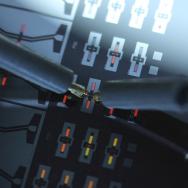The University of Chicago today announced a $100 million commitment from the Pritzker Foundation to support the new Pritzker School of Molecular Engineering, becoming the first university in the United States with a school dedicated to this emerging field.
The Pritzker School of Molecular Engineering will expand the University’s research, education, technology development and impact in molecular engineering, which builds on advances in basic science to design technology from the molecular level up, providing pivotal new approaches to fundamental societal challenges. It is the University’s first new school in three decades and its first school in engineering.
The new commitment from the Pritzker Foundation builds on the success of efforts by the University and Argonne National Laboratory, which partnered in 2011 to establish the Institute for Molecular Engineering. The Institute, which has been supported by the Pritzker Foundation since its inception, will now be elevated to the Pritzker School of Molecular Engineering in recognition of its success, and impact, and the ongoing and planned major expansion of its research and education programs, and the Pritzker Foundation’s increased support. The Pritzker Foundation is made up of four trustees from the Pritzker family: Tom, Nick, Penny, and Gigi Pritzker.
Like the Institute, the Pritzker School of Molecular Engineering will be distinct from other engineering programs, with an organizational structure that transcends traditional boundaries and focuses on societal problems primed for new solutions. The Pritzker School of Molecular Engineering will continue to build programs in quantum engineering, biotechnology and immuno-engineering, advanced materials, energy storage, and ensuring a clean global water supply. The commitment of the Pritzker Foundation will allow for expansion to address other fundamental problems and promote new collaborations among leading researchers from diverse science and engineering disciplines.
“The Pritzker Foundation has been committed to the idea of molecular engineering since the University first began to develop this area. Molecular engineering has been critical to expanding the University’s capacity to contribute to science, engineering, and technology development, and to do so in a highly distinctive way. The latest commitment of the Pritzker Foundation will support dramatic further expansion and long-term sustainability of the University’s work in molecular engineering,” said President Robert J. Zimmer. “The Pritzker School of Molecular Engineering will have a major impact on the city of Chicago, its capabilities in technology development, and the University’s outreach initiatives across the city.”
“I became interested in molecular engineering nearly a decade ago when it was just a bold idea, recognizing the potential for the University to help build a new field of study. Molecular engineering could provide a disruptive approach to translational science, while supporting the continuing evolution of the University of Chicago and becoming a catalyst to make Chicago a center of excellence in scientific innovation,” Tom Pritzker said. “Under the leadership of University faculty and President Zimmer, that powerful idea is becoming a reality. Our early support provided resources to develop the initiative and recruit Matthew Tirrell as founding director. As molecular engineering at the University gained traction, we wanted to support the next exciting phase.”
“Chicago’s future rests on ensuring access to high-quality education and developing jobs for the next generation of new businesses. By creating the nation’s first school of molecular engineering, the University of Chicago will transform the opportunities available for our young people while helping our city lead the 21st century in technology and innovation,” said Chicago Mayor Lori Lightfoot. “The new STEM partnership between UChicago and City Colleges of Chicago will also inspire students from across the city to take the next step in building the skills they need for rewarding careers.”
Solving global problems
The Pritzker School of Molecular Engineering is organized around interdisciplinary research themes with the goal of developing new kinds of solutions for pressing global challenges, including the search for sustainable energy, immunotherapy-based approaches to cancer and virtually “unhackable” communications networks. By expanding an approach started at the Institute, which brings scientists together to address important multifaceted problems rather than fixed disciplines, the Pritzker School of Molecular Engineering aims to more effectively address issues that require integrated, convergent approaches.
The Pritzker School of Molecular Engineering builds upon a critical relationship with UChicago-affiliated Argonne National Laboratory, which has been managed by UChicago since the lab’s founding.
Its unique and powerful scientific instrumentation, global leadership in computing, and breadth of scientific expertise has made Argonne a key partner since the inception of the University’s work in molecular engineering.
The University’s wide-ranging work in molecular engineering has grown rapidly and now encompasses 28 faculty and about 300 people in all, including undergraduates, PhD students, postdoctoral researchers, and research staff. It also has a pioneering program, STAGE Lab, that combines art and science. To date, the University’s scientists and engineers in molecular engineering have filed 69 invention disclosures and launched six companies.
“The generous support of the Pritzker Foundation will enable us to both deepen and broaden our efforts in areas of global significance, such as sustainability and natural resources, advanced materials design, and translational systems biology,” said Matthew Tirrell, the founding Pritzker director and dean of the Pritzker School of Molecular Engineering. “Our mission is to develop solutions to problems that have a profound effect on humanity and quality of life. This gift provides critical support to address the spectrum of areas where we can make a difference.”
Commitment to the future of molecular engineering
The Pritzker Foundation is providing a new gift of $75 million to create the Pritzker School of Molecular Engineering, bringing its combined contributions for molecular engineering at UChicago to $100 million. The previous gifts supported the founding of the Institute for Molecular Engineering and the construction of the Pritzker Nanofabrication Facility.
The Pritzker Foundation has long been a generous supporter of the University. In addition to its support for the Pritzker School of Molecular Engineering, the Pritzker Foundation has provided important support of Urban Labs, the Urban Education Institute and the Institute of Politics Pritzker Fellows Program during the University of Chicago Campaign: Inquiry and Impact. The Pritzker School of Medicine was named for the Pritzkers in 1968, and they have continued to support it since that time. The Foundation has also generously provided support for the University of Chicago Laboratory Schools and South Asian Studies.
Training a new generation
A new field of engineering requires a new form of education. The molecular engineering program at UChicago has been a leader in pioneering new ways to train scientists and engineers, such as the Quantum Information Science and Engineering Network, a nationwide program that groups graduate students with an academic advisor and one from a leading national laboratory or technology company.
“For nascent fields, such as the emerging discipline of quantum engineering, today’s approach to educating students is not sufficient to prepare scientists and engineers for competitive careers in industry or academia,” said David Awschalom, the Liew Family professor in molecular engineering who holds a joint appointment in the Materials Science Division at Argonne National Laboratory. “Scientific teams need to be grounded in a variety of disciplines—not just physics and chemistry, but also electrical engineering, materials research and computer science. This integration is precisely how our program in the Pritzker School of Molecular Engineering is designed. Students trained here will become the quantum-ready workforce of tomorrow.”
The University and Pritzker Foundation saw an important opportunity through the Pritzker School of Molecular Engineering to grow support for Chicago-area students interested in science, technology, math, and engineering. This includes launching a new partnership with City Colleges of Chicago, bringing together the resources of the Pritzker School of Molecular Engineering with City College students interested in pursuing a four-year degree in STEM fields. The intensive, multi-year program, which will be piloted with Truman and Kennedy-King colleges, will connect students to the faculty and labs at the Pritzker School of Molecular Engineering as well as college readiness and admissions counseling, with the goal of growing the number of City College students able to transfer into a four-year STEM degree program.
The Pritzker School of Molecular Engineering will continue to build its current K-12 programs, which already include events and internships throughout the year—from helping third-graders extract DNA from bananas to introducing middle schoolers to the fundamentals of molecular engineering.


